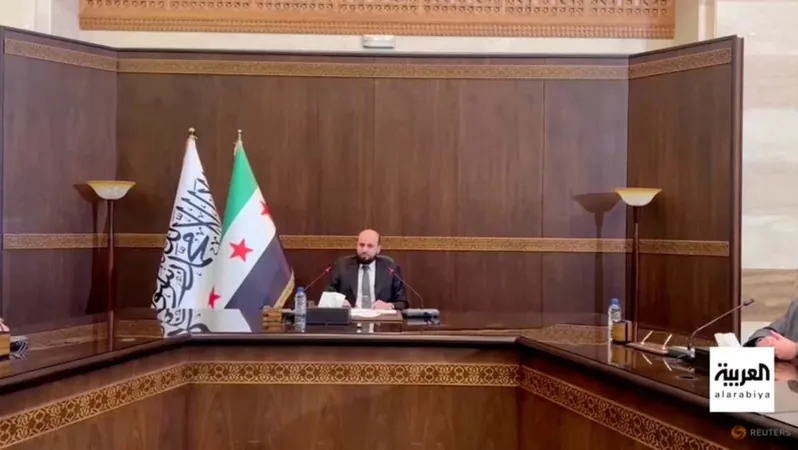
New Syrian Prime Minister Pledges Protection for All Religious Groups Amidst Political Turmoil
2024-12-12
Author: Yu
In a significant shift for the Syrian political landscape, the newly appointed interim Prime Minister of Syria has made bold promises to safeguard the rights of all religious minorities within the country. This comes as a response to the recent ousting of President Bashar al-Assad, who fled during an unprecedented military offensive led by Hayat Tahrir al-Sham (HTS) and its allies.
The swift change in power has ignited intense celebrations among Syrians, who have endured decades of authoritarian rule, characterized by oppression, political executions, and an ongoing civil war that has claimed around 500,000 lives and displaced millions. Residents of Assad’s native region are expressing newfound hope, as articulated by Ibtissam Kaab, who described a previously stifling environment where speaking out was met with threats.
Despite the enthusiasm surrounding the regime change, concerns loom over the future stability and governance of this diverse nation. The new leadership, however, has assured various minority groups that their rights will be respected in a bid to foster inclusivity. Mohammad al-Bashir, the interim Prime Minister, emphasized in an interview that Islam would be a unifying force guaranteeing rights for all sects.
Remarkably, HTS, which has historical ties to Al-Qaeda and is designated a terrorist organization by many Western nations, has been trying to moderate its image. Abu Mohammed al-Jolani, the group's leader, has publicly vowed to seek justice for victims of the previous administration, calling for the prosecution of officials complicit in torture.
U.S. Secretary of State Antony Blinken is set to tour the region, promoting a Syrian-led transition towards a democratic government. He is expected to address key issues such as preventing Syria from becoming a terrorist stronghold and stabilizing relations with neighboring countries, particularly Turkey and Israel, which have both conducted military operations in Syria after Assad’s departure.
Amidst the political upheaval, the challenges of rebuilding the war-torn nation are daunting. Al-Bashir urged the estimated six million Syrian refugees to return home, asserting the country has reclaimed its dignity and freedom. Encouraging signs of normalization include the imminent reopening of Damascus International Airport, closed since the insurgency began.
As residents in cities like Aleppo start to breathe easier after years of living in fear, they are also confronting economic hardships. Basic commodities are increasingly unaffordable, particularly as markets slowly begin to stabilize. Despite the upheaval, various localities are reporting a sense of security returning to their lives.
Adding to the dramatic shifts, the Baath Party, which once represented Assad's regime, announced it would cease operations indefinitely and transfer its assets to the new transitional authorities. Meanwhile, Russia, a crucial ally to the Assad regime, expressed a desire for swift stabilization in Syria while condemning Israeli strikes on Syrian military sites.
As the international community watches closely, some officials have cautioned against foreign military actions that could undermine the fragile transition of power. The outcome of this political transformation remains to be seen, with everyone hopeful that the future will be genuinely better for the Syrian people, free from the shadows cast by previous leadership.
With pivotal meetings on the horizon, including discussions by G7 leaders on supporting HTS, the world is left poised between optimism and apprehension. The question linger—will Syria truly embark on a new path free from tyranny, or will it stumble back into chaos?




 Brasil (PT)
Brasil (PT)
 Canada (EN)
Canada (EN)
 Chile (ES)
Chile (ES)
 España (ES)
España (ES)
 France (FR)
France (FR)
 Hong Kong (EN)
Hong Kong (EN)
 Italia (IT)
Italia (IT)
 日本 (JA)
日本 (JA)
 Magyarország (HU)
Magyarország (HU)
 Norge (NO)
Norge (NO)
 Polska (PL)
Polska (PL)
 Schweiz (DE)
Schweiz (DE)
 Singapore (EN)
Singapore (EN)
 Sverige (SV)
Sverige (SV)
 Suomi (FI)
Suomi (FI)
 Türkiye (TR)
Türkiye (TR)